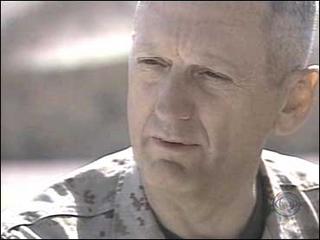Gen. Mattis.

From Colonel Craig USMC:
"Distinctions of War"
"General Mattis's mistake."
According to a report in the Washington Times, "his comments evoked laughter and applause from the audience."
Of course his, comments also evoked criticism from many of the usual suspects. For instance the Council on American-Islamic Relations (CAIR) called on the Pentagon to discipline Gen. Mattis for the remarks. CAIR's council's executive director, Nihad Awad said, "We do not need generals who treat the grim business of war as a sporting event. These disturbing remarks are indicative of an apparent indifference to the value of human life."Knowing Gen. Mattis's record, I disagree with such characterizations - but that's because I know his record. Unfortunately, the thrust of the criticism by CAIR and others is, alas, correct. The context of the comments makes clear that Gen. Mattis was having some fun and playing to his audience. My criticism of Gen. Mattis is that he forgot that he wasn't trying to inspire his Marines but was instead addressing a civilian group with press present. We wouldn't want the ladies of the press getting a case of the vapors, now, would we? In addition, anyone who doesn't know Gen. Mattis's record, or who doesn't care about it, can use his comments to paint the Marines as, in the infamous characterization of an assistant secretary of the Army during the Clinton administration, "extremists" out of step with liberal society. But those who would use Gen. Mattis's words to defame him or - most especially - the Marine Corps owe it to themselves to examine his record as a combat leader in Afghanistan, where he served as a commander of the Naval Task Force that seized an advanced airbase at the opening of that campaign; and Iraq, where he commanded the storied 1st Marine Division during the march up to Baghdad. The fact is that Gen. Mattis is probably the finest Marine combat leader since the legendary Chesty Puller. I have never met a Marine who served with Gen. Mattis who had anything less than the highest regard for him. Anyone who has seen him knows he doesn't "look" like a Marine but he sure knows how to act like one. And acting like a Marine makes room for such principles of restraint in war as chivalry (defend the weak and the innocent) and proportionality (use only the force necessary to achieve the objective). For the most part, observers agree that the Marines of Gen. Mattis's division treated surrendering Iraqi humanely - the way they are supposed to be treated. Here is the "message to all hands" that then-Major General Mattis issued to his troops as they prepared to enter Iraq in March 2003:
Note the admonition to "engage your brain before you engage your weapon." This is not the instruction of a man who looks forward to indiscriminate killing. For the most part, his young Marines responded admirably, despite the likelihood that the enemy would take advantage of the Marines' restraint.
And like Henry V, Gen. Mattis always led from the front. During the march up to Baghdad, Mattis had prepared his command well and it responded to his style of leadership. The Marines that Gen. Mattis led on the road to Baghdad made the sort of distinctions that their commanding general directed them to make. They encountered Iraqi soldiers of all kinds: soldiers of regular units, some of whom fought and some of whom didn't; militia, who preferred not to fight but sometimes did because they were intimidated by Saddam's fedayeen; and foreign jihadis.
This is a distinction we once made without compunction: between those who are entitled to the rights of legitimate combatants and those who are not. This distinction was first made by the Romans and subsequently incorporated into international law by way of medieval European jurisprudence. As the eminent military historian, Sir Michael Howard, wrote in right after 9/11, the Romans distinguished between bellum, war against legitimus hostis, a legitimate enemy, and guerra, war against latrunculi - pirates, robbers, brigands, and outlaws - "the common enemies of mankind."
The former, bellum, became the standard for interstate conflict. It is here for instance that the Geneva Conventions were meant to apply. They do not apply to the latter, Guerra - indeed, punishment for latrunculi traditionally has been summary execution. While not employing the term, many legal experts agree that al Qaeda fighters are latrunculi - hardly distinguishable by their actions from pirates and the like. Who knows what some silly judge might rule in the future, but at least so far, no terrorist organization has been deemed a combatant under the laws of armed conflict.In retrospect, Gen. Mattis's publicized comments were imprudent. But in his soldier's way, he was making a necessary distinction that many in the press or the courts are not, e.g. those who hold that terrorist detainees are entitled to prisoner-of-war status and the rights put forth in the Geneva Conventions. Nonetheless, we must acknowledge that Gen. Mattis committed a "gaffe" - he blurted out something of the truth. - Mackubin Thomas Owens is an associate dean of academics and professor of national-security affairs at the Naval War College in Newport, R.I. He led a Marine rifle platoon in Vietnam in 1968-69. Colonel Craig USMC. | |||

0 Comments:
Post a Comment
Subscribe to Post Comments [Atom]
<< Home